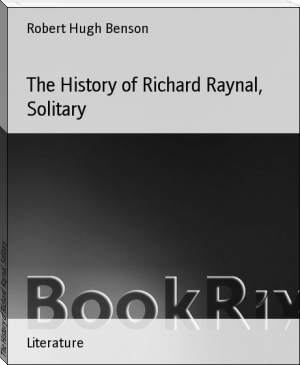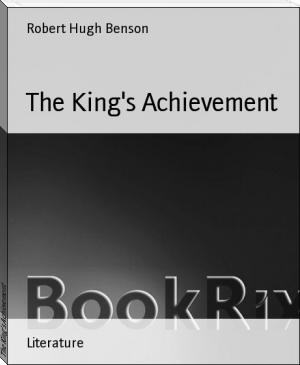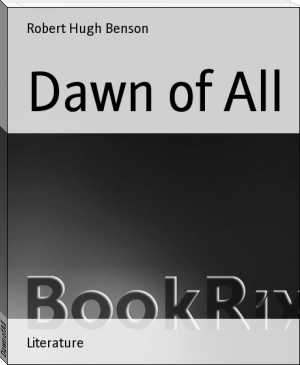The History of Richard Raynal, Solitary by Robert Hugh Benson (romance novel chinese novels txt) 📖

- Author: Robert Hugh Benson
Book online «The History of Richard Raynal, Solitary by Robert Hugh Benson (romance novel chinese novels txt) 📖». Author Robert Hugh Benson
So Master Richard answered and closed his eyes to commune with God. And the young man went away sighing but speaking no word.
Of the Dark Night of the Soul
De profundis clamavi ad te, Domine: Domine exaudi vocem meam.
Out of the depths I have cried to Thee, O Lord: Lord, hear my voice.--Ps. cxxix. 1, 2.
XI
The third temptation was so fierce and subtle, that I doubt whether I wholly understood it when Master Richard tried to tell it to me. He did not tell me all, and he could answer but few questions, and I fear that I am not able to tell even all that I heard from him. It was built up like a house, he said, stone by stone, till it fenced him in, but he did not know what was all its nature till he saw my lord cardinal.
A soul such as was Master Richard's must have temptations that seem as nothing to coarser beings such as myself: as a bird that lives in the air has dangers that a crawling beast cannot have. There are perils in the height that are not perils on the earth. A bird may strike a tree or a tower; his wings may fail him; he may fly too near the sun till he faint in its heat; he cannot rest; if he is overtaken by darkness he cannot lie still. [Sir John enumerates at some length other such dangers to bird life.]....
* * * * *
Now Master Richard described the state into which he fell under a curious name that I cannot altogether understand. He said that there be three _nights_ through which the contemplative soul must pass or ever it come to the dawn. The first two he had gone through during his life in the country; the first is a kind of long-continued dryness, when spiritual things have no savour; the second is an affection of the mind, when not even meditation [This is an exercise distinct from contemplation apparently. I include this passage, in spite of its technicalities, for obvious reasons.] appears possible; the mind is like a restless fly that is at once weary and active. This second is not often attained to by ordinary souls, though all men who serve God have a shadow of it. It is a very terrible state. Master Richard told me that before he suffered it he had not conceived that such conflict was possible to man. It was during this time that the fiend came to him in form of a woman. The imagination that cannot fix itself upon the things of God is wide-awake to all other impressions of sense. [I do not think that Sir John understands what he is writing about, though he does his best to appear as if he did. I have omitted a couple of incoherent paragraphs.]....
Now, these two first _nights_ I think I understand, for he told me that what he suffered during his whipping in the hall and the strife of his mind with the clerk were each a kind of symbol of them. But the third, which he called the _Night of the Soul_ I do not understand at all. [It is remarkable that this phrase frequently occurs in the writings of St. John of the Cross, though he treats it differently. Until I came across it in this MS. I had always thought that the Spanish mystic was the first to use it.] This only can I say of the state itself: that Master Richard said that it was in a manner what our Lord suffered upon the rood when he cried to His Father _Eloi, Eloi, etc._
But I can tell you something of the signs of that affliction, as they shewed themselves to Master Richard. Of the interior state of his soul I cannot even think without terror and confusion. Compared with the darkness of it, the other _nights_, he said, are but as clouds across the sun on a summer's day compared with a moonless midnight in winter. He had suffered a shadow of it before, when he was entering the contemplative state, or the prefect Way of Union. Now it fell upon him. Before I tell you how it came, I must tell you that this _night_, as he explained it, takes its occasion from some particular thought, and the thought from which it sprang you shall hear presently.
When the clerk had left him, sighing, as I said, as if with a kindly weariness (to encourage the other to call for him, I suppose), Master Richard committed himself again to God and lay still.
A fellow came in soon with his supper (for it was now growing dark), set it by him and went out. Master Richard took a little food, and after a while, as his custom was after repeating the name of Jesu, began to think on God, on the Blessed and Holy Trinity, and on His Attributes, numbering them one by one and giving thanks for each, and marking the colour and place of each in the glory of the throne. He was too weary to say vespers or compline, and presently he fell asleep, but whether it was common sleep or not I do not know.
In his sleep it seemed to him that he was walking along a path beneath trees, as he had walked on his way to London; but it was twilight, and he could not see clearly. There was none with him, and he was afraid, and did not know what he feared. He was afraid of what lay behind, and on all sides, and he was yet more afraid of what lay before him, but he knew that he could not stay nor turn. He went swiftly, he thought, and with no sound, towards some appointed place, and the twilight darkened as he went; when he looked up there was no star nor moon to be seen, and what had been branches when he set out seemed now to be a roof, so thick they were. There was no bray of stag, nor rustle of breeze, nor cry of night-bird. He tried to pray, but he could remember no prayer, and not even the healthful name of _Jesu_ came to his mind. He could do nought but look outwards with his straining eyes, and inwards at his soul; and the one was now as dark as the other. He thought of me then, my children, and longed to have me there, but he knew that I was asleep in my bed and far away. He thought of his mother whom he had loved so much, but he knew that she was gone to God and had left him alone. And still, through all, his feet bore him on swiftly without sound or fatigue, though the terror and the darkness were now black as ink. He felt his hair rising upon his head, and his skin prickle, and the warmth was altogether gone from his heart, but he could not stay.
And at the last his feet ceased to move, and he stood still, knowing that he was come to the place.
Now, I do not understand what he said to me of that place. He told me that he could see nothing; it was as if his eyes were put out, yet he knew what it was like.
It was a little round place in the forest, with trees standing about it, and it was trampled hard with the footsteps of those who had come there before him. But that was no comfort to him now; for he did not know how these persons had fared, nor where were their souls.
So he stood in the black darkness, knowing that he could not turn, with the horror on him so heavy that he sweated as he told me of it, and with the knowledge that something was approaching under the trees without sound of step or breathing--he did not know whether it was man or beast or fiend, he only knew that it was approaching. Yet he could not pray or cry out.
Then he was aware that it had entered the little space where he stood, and was even now within a hand's grasp. Yet he could not lift his hands to ward it off, or to pray to God, or to bless himself.
Then he perceived that the thing--_negotium perambulans in tenebris_ ["the Business that walketh about in the dark" (Ps. xc. 6.)]--was formless, without hands to strike or mouth to bite him with, and that it was all about him now, closing upon him. If there had been aught to touch his body, wet lips to kiss his face, or fiery eyes to look into his own, he would not have feared it with a thousandth part of the fear that he had. It was that there was no shape or face, and that it sought not his body but his soul. And when he understood that he gave a loud cry and awoke, and knew, as in a mystery, that it was no dream, but that he was indeed come to the place that he had seen, and that this _negotium_ was at his soul's heart. [There is either an omission here in the translation of Sir John's original MS., or else the transcriber has dashed his pen down in horror, or sought to produce an impression of it.]....
I find it impossible, my children, to make you understand in what state he was; he could not make even me understand. I can only set down a little of what he said.
First, he knew that he had lost God. It was not that there was no God, but that he had lost Him of his own fault and sin. He was aware that in all other places there was God and that the blessed reigned with Him, but not in the place where he was, nor in his heart. In all men that ever I have met there was a certain presence of God. As the apostle told the men of Athens, _Ipsius enim et genus suum_; ["For we are also His offspring" (Acts xvii. 28.)] and, again, _Non longe est ab unoquoque nostrum_; ["He is not far from every one of us" (Acts xvii. 27.)] and again, _In ipso vivimus, et movemur, et sumus_. ["In Him we live, and we move, and we are" (Acts xvii. 28.)] I have not seen a man who had not this knowledge, though maybe some, such as Turks and pagans, may call it by another name. But until death, I think, all men, whatever their sins or ignorance, live and move in God's Majesty. Hell, Master Richard told me, is nothing less than the withdrawal of that presence, with other torments superadded, but this is chief. Master Richard told me that that black fire of hell rages wherever God is not; and that the worm gnaws in all hearts that have lost Him, and know it to be by their own fault--_maxima culpa_. ["the very great fault."]
There be a few men in this world--the Son of God derelict is their prince--who are called to this supreme torment while they yet live--if indeed that man may be said to live who is without God--and of this company Master Richard was now made one.
It was with him now as he had dreamed. Where God is
 Have you ever thought about what fiction is? Probably, such a question may seem surprising: and so everything is clear. Every person throughout his life has to repeatedly create the works he needs for specific purposes - statements, autobiographies, dictations - using not gypsum or clay, not musical notes, not paints, but just a word. At the same time, almost every person will be very surprised if he is told that he thereby created a work of fiction, which is very different from visual art, music and sculpture making. However, everyone understands that a student's essay or dictation is fundamentally different from novels, short stories, news that are created by professional writers. In the works of professionals there is the most important difference - excogitation. But, oddly enough, in a school literature course, you don’t realize the full power of fiction. So using our website in your free time discover fiction for yourself.
Have you ever thought about what fiction is? Probably, such a question may seem surprising: and so everything is clear. Every person throughout his life has to repeatedly create the works he needs for specific purposes - statements, autobiographies, dictations - using not gypsum or clay, not musical notes, not paints, but just a word. At the same time, almost every person will be very surprised if he is told that he thereby created a work of fiction, which is very different from visual art, music and sculpture making. However, everyone understands that a student's essay or dictation is fundamentally different from novels, short stories, news that are created by professional writers. In the works of professionals there is the most important difference - excogitation. But, oddly enough, in a school literature course, you don’t realize the full power of fiction. So using our website in your free time discover fiction for yourself. 




Comments (0)